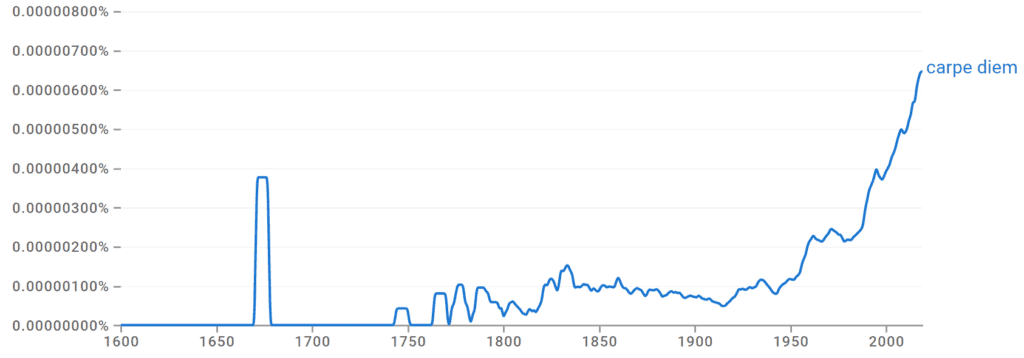Many popular sayings in the English language are derived from other languages or phrases that have been made popular through the ages.
The idea behind carpe diem is an ancient philosophy first coined in the 300s BC that has been adapted through history by poets and authors for hundreds of years. It means to make the best of things and live life to the fullest; literally, seize the day or the moment.
Let’s look at the origins of this thought and how you can use it today.
What Is the Meaning of Carpe Diem?

Carpe diem is a Latin phrase that is popularly translated as seize the day, meaning to make the most of each moment of your life or live life to the fullest. Most Latin scholars translate the phrase carpe diem as “pluck the day, it is ripe.”
Today carpe diem mindset is generally used as an exhortation to grab opportunities and live your moments in life to the fullest without any reference to the future.
Is Carpe Diem Capitalized?
Carpe diem is a simple Latin phrase and is not subject to any rules of capitalization. Therefore, it is left in lowercase unless it begins a sentence.
Carpe Diem Origin

The Latin poet Horace coined the term carpe diem in his Odes, published in 23 BC. The entire phrase is “carpe diem, quam minimum credula postero,” which means “pluck the day, trusting as little as possible in the future.” Horace championed Epicureanism, a philosophy taught by Epicurious around 307 BC, which expounded the idea that pleasure is the most important thing in life and is attained through simple living.
The sentiment became popular again with the Cavalier Poets of the 16th and 17th centuries, with it waxing and waning in use until its translation was again popularized by the movie The Dead Poets Society starring Robin Williams in 1989.
Using Carpe Diem in a Sentence
- I want my students to remember their call to achieve goals and dreams through hard work, the means to seize upon what rightfully belongs to them, a way to carpe diem.
- Carpe diem is not a phrase to use lightly in relation to growing old; you must seize upon all that is left to you.
- If carpe diem means to seize the day, then we need to seize upon all that is given to us to succeed.
Let’s Review
The idea behind carpe diem is thousands of years old and explains the philosophy that a future is fleeting, but today is what you make it. The phrase was made popular by the Latin poet Horace, even though the idea had already been in existence for a few hundred years.
Over the centuries, the idea and term have been a part of the poetic community, most recently made popular by the movie, The Dead Poets Society.
Today, carpe diem is commonly heard among intellectual communities to highlight the idea of living in the moment and enjoying all life has to offer through the simplicity of thought and habit.
